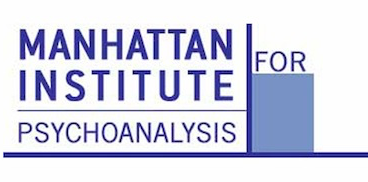An Exit Interview with Former MIP Co-Director, Veronica Csillag, LCSW
AN: As co-director of the Manhattan Institute with Steve Kirschner for three years and then for one year alongside Chaim Bromberg, you shepherded the institute through the worst presidency of our lives, complete social upheaval, worsening climate collapse and a worldwide pandemic. What was it like for you, for things to continue to worsen instead of getting better?
VC: It was like hell! I did not sign up to be co-director during a pandemic and social restructuring. The social shift that seems to be taking place is welcome and long overdue, but it’s not without challenges. Nerves are raw, tempers are flaring. It has been difficult.
AN: What kept you going?
VC: What choice did I have? I would never resign in a time of crisis. I was not going to step down, not only out of concern for the institute, but I could never leave Emi in the lurch.
AN: What professional accomplishments did you manage during your tenure as co-director?
VC: I published a number of papers in a variety of journals. I was invited to be Associate Editor of Psychoanalytic Dialogues. And of course my co-directorship at the institute; I’m proud of that accomplishment.
AN: How has your epic journey as co-director changed you?
VC: That remains to be seen. Certainly in the last year or two I have not been easy to be around. I’ve been overwhelmed, depleted, short-tempered, very impatient. Amazingly enough I can be quite patient with my patients, no pun intended, but other than that I am not a patient person.
AN: Apart from running the institute amidst chaos, how did you manage to take care of yourself?
VC: I didn’t. Self care is next. I started exercising again. I went to see a physical therapist to address what hurts here and there. Sitting in the same chair for fifteen months straight was not good for the body or the soul. I took a sailing class in June, got a season’s pass to my favorite beach, vacationed in California. I wish to attend to my friendships.
AN: I am wondering what advice you have for leadership going forward?
VC: Let things roll off your shoulders as much as you can. Don’t take everything personally. Reserve your energy for what is pressing and urgent.
AN: How do you see the expanding awareness of social injustice affecting the field of psychoanalysis?
VC: It is shaping psychoanalysis in cycles. Back in the day, psychoanalysis had a strong social component and that fell by the wayside. American humanistic and interpersonal psychoanalysis always had a social perspective that was often dismissed by the more intra-psychically oriented schools.
AN: When did the social component go away?
VC: American psychoanalysis took a sharp conservative turn, right after the war, which is well documented, when all of the Jewish survivors came to the United States and they were immigrants and didn’t know the language well and had massive trauma to deal with. The focus was on the intra-psychic. Same in England. Melanie Klein and Anna Freud were both refugees from war-torn Europe and persecution. So it was too, too close to consider the social. I think American psychoanalysis has become much more progressive in the last few decades with the advent of the relational school interested in the social, also there has been somewhat of a turn toward intergenerational trauma, as it pertains to the massacre of the indigenous population, slavery, colonialism, the Shoah. This is a welcome change. The challenge is to not lose sight of the intra-psychic and the interpersonal, while keeping focus on the social. You can’t really separate the social from the interpersonal and the psychic anyway because the social imprints what’s inside. We recreate the social in the living room and the bedroom.
AN: Who do you tend to quote or paraphrase the most when you’re teaching and supervising?
VC: Bion, Winnicott and Ogden. I refer to them more than anyone else.
AN: What’s stayed with you that a supervisor or mentor once shared that became part of your formation as an analyst?
VC: My supervisor at the Jewish Board was a child of Holocaust survivors, more specifically Polish Holocaust survivors, an important distinction, because the Polish Jews ended up spending multiple years in the ghettos and the camps, whereas the Hungarian Jews were not sent to Auschwitz until the spring of 1944. Anyway, she grew up in Israel and came to the States, and she was very much into survivors and the second generation, and that was before it became the talk of town. That was an eye-opener for me and shaped my identity and my relationship with my own Jewishness, which up until that point hadn’t seemed significant.
Another discovery took place in my first psychoanalytic psychotherapy. My analyst helped me understand that we can think and feel whatever we damn well please. The psyche is not the Ten Commandments or the Catholic Church. You are not responsible for your feelings or your thoughts. There are emotional states that are unbearable but God’s wrath will not descend upon you for having them. You are only responsible for your actions. That was very, very liberating.
What else? My second analysis was my training analysis, and through that I have come to better terms with my aggression. My analyst accepted my aggression. Sometimes not so well, but still, that opened up room for working through the rupture. That was very helpful. My first year of supervision as a candidate was also particularly important, partially because of the steep learning curve. Willa Colbert was my supervisor and she was just amazing.
AN: If you could host a dinner party with anyone, who would you invite?
VC: Wilfred Bion. Not only was he a brilliant thinker but supposedly he was also a real mensch, a decent person. I imagine he would be incredible company.
AN: What is an over-emphasized psychoanalytic concept, in your opinion?
VC: For a long time now relational psychoanalysis has been privileging elasticity and spontaneity over other modes of psychoanalytic participation, such as reverie, listening, silent contemplation. Not everything is transference and countertransference. While it is the sine qua non of psychoanalysis, not everything is about the relationship between the analyst and analysand. Following Bion and Ogden, and others, my psychoanalytic credo is to facilitate our patients’ ability to bear their own feelings and to think thoughts that on their own would be too overwhelming and scary to have, and by helping people to expand their area of functioning and being.
AN: Do you use the couch?
VC: Yes. In a training analysis I do recommend the couch. For patients not in the field who come once per week I only offer it. People with an intense emotional life, and especially people who are insecure and narcissistically vulnerable and are constantly scanning their analyst’s face for reactions—I think it’s good for them to have an opportunity to be a little less vigilant and to connect differently. The couch allows people to look inside a bit more and to not get caught up in whether or not someone seems to approve of what they are saying.
AN: What are you reading now?
VC: I just finished Pachinko by a Korean American named Min Jin Lee, which is a family saga that takes place in Korea. I have also just read a paper: The Depiction of Sexual Assault and Rape in Literature and Fine Art, by an art historian friend, Aniko B. Nagy. I have read Necropolitics by Achille Mbembe. I’m reading a lot about race and race relations, and have read mostly that for the last year, besides fiction.
AN: What is your advice for budding analysts?
VC: There is no magic trick. You just have to keep doing it, and doing it, and doing it. Take on as many patients as you can handle. Some clinicians are done after five sessions a day and some can see more. Don’t be picky, take on difficult, demanding patients, judiciously. Be mindful of secondary traumatization. Have a peer group. Write.
AN: What are you writing?
VC: Nothing right now. I am in the process of completing a book, of which I am the editor and a contributor. The title is From Budapest Psychoanalysis: Three portraits and their analytic frames. It will be published in the Psychoanalysis in a New Key Book Series by Routledge, Series Editor, Donnel B. Stern. It is autobiographical, not pure psychoanalysis. I have an idea for another project, another book, but I am not ready to discuss that. I want a relatively low stress year. I am starting a study group in the fall, focused on reading and supervision. Writing will be optional.
AN: What do you love about psychoanalysis?
VC: It’s a privilege to hear people’s innermost thoughts and experiences and stories. I’m curious. The ingredients you need to be a good psychoanalyst are a deeply narcissistic parent, preferably a mother, whom you learn to take care of and try to cure very early on. You need to be a voyeur or else you will get bored to death listening to all the details multiple times. And you need to have patience, which can be learned. You need to approach the work without memory or desire. The only time that it’s appropriate to forcefully intervene is when you need to talk someone off a ledge. Get the needle out of an arm. Other than that people have the right to f@&! up their lives any which way they want.
I like the emotional participation. It’s very engaging and often quite narcissistically gratifying, at least until someone brings up what they don’t like about you, and what you don’t want to hear. Even so, that gets interesting. I get to use my emotional range as well as my intellect. Whatever anyone else says, psychoanalysis is an intellectual pursuit. You don’t have to be a rocket scientist but you do have to be able to follow people’s thoughts with a certain degree of intellectual sophistication. You need to be familiar with the literature. “I hear your pain” is not enough. Comments are to be made, observations to be shared.
AN: What would you be if you were not a psychoanalyst?
VC: I think psychoanalysis is a very good fit for me. In a different world I may have trained to be a physician. I think I’m happier as a psychoanalyst. Oh, maybe I would have been a double agent. No, just kidding. I don’t have the stomach for that.
AN: You express yourself by saying what you feel quite freely, and I find that to be badass. I imagine you to be radical in other ways.
VC: Yes, I am a badass. I have become quite direct. Take it or leave it. It’s not everyone’s cup of tea. I don’t mean to suggest that I am not concerned with my impact, or with how my words will land on someone. But sooner or later you need to tell it how it is and not pussyfoot all the time. Politically, I am quite left. I come from Marxism and Neo-Marxist criticism.
AN: You are an iconic strong leader and a rock, and I’m grateful to have had my formation under your wing. On behalf of the institute, thank you for everything.
VC: That’s lovely to hear. I’m not going anywhere. I’ll be around. I am happy to offer guidance, I just don’t want to have to compose 35 or more emails each week.
AN: Before we stop, can you say what you are the very most proud of?
VC: Under my watch the institute shifted so much in the direction of transparency, inclusion, and diversity. Not all or most of it is my doing, but I contributed. I am very happy and pleased with the One Year Program and how it has been transformed. It was not my idea, but I supported it from the moment I heard about it and pushed strongly for its establishment. The Manhattan Institute has become a progressive beacon. I am very proud of this development.
AN: Anything else?
VC: Anything? If I were a car I would like to be a Tesla, Elon Musk notwithstanding. If I were an animal I would like to be some kind of a cat—a leopard or a panther. A bigger kind of cat.
Veronica Csillag, LCSW, is Faculty, Training and Supervising Analyst, and former Co-Director, Manhattan Institute for Psychoanalysis; Faculty, National Institute for the Psychotherapies. Associate Editor, Psychoanalytic Dialogues. She is the author of several psychoanalytic papers, which have been published in a variety of journals, The American Journal of Psychoanalysis, Psychoanalytic Dialogues and The Psychoanalytic Quarterly among them. She is in private practice in New York City.
If you enjoyed this post, we recommend:








4 Comments
Leave your reply.